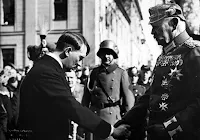The Western bourgeoisie and the Purge
The Western bourgeoisie and the Purge
By and large, the 1937--1938 purge succeeded in its purpose. There was also a lot of damage and many errors were committed, but these could probably not have been avoided, given the internal situation of the Party. Most of the men and women in the Nazi Fifth Column fell during the purge. And when the fascists attacked the USSR, there were few collaborators within the State and Party apparatus.
When we listen to Social Democrats, Christian Democrats, liberals and other bourgeois speaking of Stalin's `absurd terror', of the `bloody despot', we would like to ask them where they and people like them were in 1940, when the Nazis occupied France and Belgium. The great majority who, here at home, denounced Stalin's purge, actively or passively supported the Nazi régime as soon as it was set up. When the Nazis occupied Belgium, Hendrik de Man, the President of the Socialist Party, made an official declaration to praise Hitler and to announce that the arrival of the Hitlerite troops meant the `liberation of the working class'! In `The Manifesto to the Members of the POB (Belgian Workers' Party)', published in July 1940, de Man wrote:
`The war has led to the debacle of the parliamentary regime and of the capitalist plutocracy in the so-called democracies. For the working classes and for socialism, this collapse of a decrepit world, far from being a disaster, is a deliverance .... the way is open for the two causes which sum up the aspirations of the people: European peace and social justice.'
Peter Dodge, Beyond Marxism: The Faith and Works of Hendrik de Man (The Hague: Martinus Nijhoff, 1966), pp. 196--197.
In history courses, they beat our eardrums with all the scandalous lies about Stalin, but they do not tell us that the President of the Belgian Socialist Party, great critic of the Stalin purge, hailed the Nazis in Brussels! It is a well established fact that not only Hendrik De Man, but also Achille Van Acker, future Prime Minister of `democratic' Belgium, collaborated with the Nazis as soon as they arrived. When we hear these people say that the purge organized by Stalin was `criminal' and `absurd', we understand them. Those who were preparing to collaborate with the Nazis were of the same family as most of the `victims of the purge'. In France too, the vast majority of the parliamentary Socialists voted full powers to Pétain and helped set up the collaborating Vichy régime.
Furthermore, when the Nazis occupied Belgium, resistance was almost non-existent. The first weeks and months, there was no significant resistance. The Belgian bourgeoisie, almost to a man, collaborated. And the masses were subject to and passively accepted the occupation. French author Henri Amouroux was able to write a book entitled Quarante millions de pétainistes (Forty million Petainists).
Henri Amouroux, Quarante millions de pétainistes (Paris: Éditions Robert Laffont, 1977).
Let us make a comparison with the Soviet Union. As soon as the Nazis set foot on Soviet territory, they had to confront military and civilians prepared to fight to the death. The purge was accompanied by a constant campaign of political and ideological preparation of workers for the war of aggression. In his book about the Urals, U.S. engineer Scott described well how this political campaigning took place in the factories of Magnitogorsk. He described how the Party explained the world situation to the workers, in the newspapers, in seminars, using films and theatre. He talked about the profound effect this education had on the workers.
It is precisely because of the purge and the education campaign that accompanied it that the Soviet people found the strength to resist. If that steadfast will to oppose the Nazis by all means had not existed, it is obvious that the fascists would have taken Stalingrad, Leningrad and Moscow. If the Nazi Fifth Column had succeeded in maintaining itself, it would have found support among the defeatists and the capitulationists in the Party. If the Stalin leadership had been overthrown, the Soviet Union would have capitulated, as did France. A victory of the Nazis in the Soviet Union would have immediately helped the pro-Nazi tendency in the British bourgeoisie, still powerful after Chamberlain's departure, take the upper hand from Churchill's group. The Nazis would probably have gone on to dominate the whole world.








.jpg)



